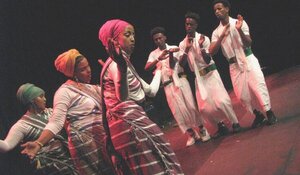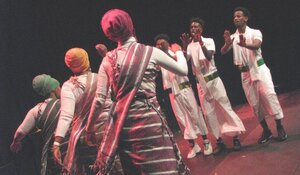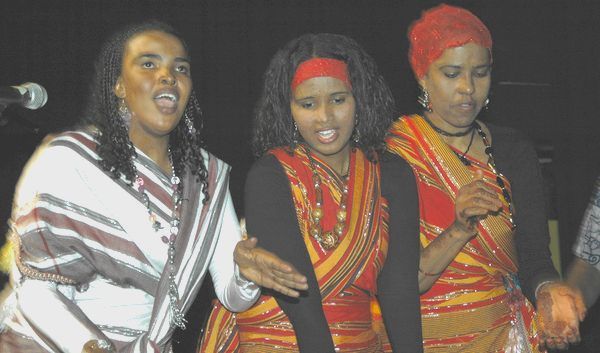Suad Mohamed, together with Jamal Mataan, has written the very first report about the Somali diaspora in Austria. It describes the different associations represented by Somalis and the community’s engagement such as offering services and consultation related to integration, cultural and sports events, and activities related to women’s empowerment in Austria and Somalia. The report was commissioned by the VIDC and will be presented in January 2021. The Somali community in Austria comprises more than 6,000 people. In Vienna there is a concentration of Somali diaspora organizations (11) and two of them are women’s organizations. In Linz and Vorarlberg there is one organization, in Salzburg two and in Innsbruck three.
I would like to focus on women’s empowerment. Are the Somali diaspora organizations in Austria also promoting gender equality, women’s empowerment and participation? Are there organizations led by women?
Of course they do. The Somali community is often criticized for being very conservative, but no one understands the history. In Somalia, at the time my mother was raising me, women had the opportunity to get education. Then the war came to Somalia and ISIS. As a consequence, women began to stay at home for their own security. When they come to Europe, it is easy to empower them because they had already experienced that some women had power in the system in Somalia. There were women in ministries. My mum studied medicine and my mother’s aunt was a school director. In the family, there was always a woman who was well educated and had a good position. Somali women are strong. This makes it easy to empower them.
In the Viennese organizations there are women on the board. Why? During the time of the war women became peace builders and peace agents. They used to protect their family and men. They were always creating jobs. When they come to Europe they have this idea about peace building for their children, for their futures. You see single mothers who never went to school. But they want their children to go to school in order to have a better life. So you will see a woman fighting with her husband who is saying that he does not want their daughter to study. What helps them is the system in Austria, and that schooling is compulsory.

What we learned from the interviews is, that it is mainly women, who bring the community together and organize gatherings. They mobilize the women who are at home and never go out and say “today we have a culture day, we will present our culture to Austria”. It is women who are coming up with ideas, programming and talking at events. The organizations in Vienna said that the women are very important because without the women they sometimes have difficulties to communicate with the community, the children and the older people.
What issues are the two women’s organizations dealing with?
They address Female Genital Mutilation (FGM) and how to empower women in this area. They are also dealing with youths, helping them with school or educational programs. During the pandemic they started to function as Covid-19 advisors. For example, they connect with women through a WhatsApp group and give them information in the Somali language. Besides, they organize cultural events for women. Both organizations are also collecting money for relief work after floods and droughts in Somalia.
Are you part of an association?
I am currently in the process of founding an association. It will not be represented by Somalis only, but it will be intercultural, with Somali and Austrian members. The co-founders are me and two Austrian friends. The board members will be Austrian, Syrian, Kurdish, Afghan and Somali.
I’m looking forward to hearing more about this endeavor in the future. Good luck with it! Let’s dig a bit deeper into the issue of women’s empowerment. You have said many positive things about the role of women. Yet, what obstacles do Somali women face?
The most important thing is that men acknowledge that we are together here. When feminism started we saw that men did not believe we could do things together, on an equal footing.
Another problem is violence against women. With regard to this I would like to emphasize that Diakonie and other organizations really offer a safe space for women to talk about violent experiences. Before, violence was a taboo topic, but now women are talking about it and searching for help. I think this is a really important step. In other words, the society and the Austrian system helps them. Women know that they need to go to German courses and that will give them the opportunity to get to know and to interact in the social environment. But if they stay at home they could be suffering from violence. Women must take the children to school every day which means they are going to see people. Other women will help those in need to go to organizations like the Red Cross, Caritas and Diakonie. Women are also obliged to participate in workshops at ÖIF which helps them to understand the system better. These compulsory courses are really good and help women to free themselves from patriarchal control and to have social contacts.

When talking about women’s empowerment I am proud to say I’m a Somali woman, considering the difficult situation we come from. We always know how to be successful, especially those who are educated. Uneducated women still struggle, but educated women are more easily able to develop themselves and take on important positions. There is Ilwad Elman and Ilhaan Omar, a US congresswoman who has been elected twice in America. There is also Halima Aden and many other women. I remember when I was young not many people knew much about Somalia. But now when I say I’m Somalian they say, “Oh, we know Ilhan Omar, we heard about Elmad.” Their faces and stories have been widespread through media. They have become role models for the empowerment of other Somali women.
Of course, there are obstacles and things we need to work on in order for more women to get education, empowerment and jobs. But I see many young Somali woman that are studying to be political scientists, social workers and nurses. The new generation is starting to go to university. The numbers are still small but I think in the coming years we can achieve a lot.
So, the seeds are starting to grow?
Yes, but we need more workshops, more conferences like this one we are working on with VIDC. We further need more youth involvement and solidarity among women. My Austrian friends and I stand together. We have different beliefs and different cultural backgrounds, but we are women encouraging each other.
Especially women who reached a high level, should empower other women. I have seen many women who are very successful, who reached very high levels. However, I wish they would help young women who also want to achieve something.
This is a good plea to close the interview. We need to encourage and empower ourselves, even across countries. The organization you are going to build, will it be based on this principle?
I have many visions. I hope we will be able to do more projects for Somali women, African women, Arab women. I will register my organization next year.
Currently I have volunteered for the Global Somali Diaspora Organization. They are bringing together the Somali diaspora to talk about the challenges related to politics, peace and security in Somalia. They invited Jamal and me to collaborate with them on their youth summit committee. Each year they hold a big conference in different countries. Last year it was in Turkey. This year because of Covid-19 it was held online. Next year it will be in Doha.
During the research for the VIDC report, I read articles from other countries, from the Netherlands and Sweden, where the Somali communities are larger than in Austria. I think it would also be good to show the people here what people are doing in these countries. This would also help them get empowered. In Sweden there are famous Somali singers. In Germany there are Somali women in politics. I think if Somali women in Austria knew about this it would empower them. Even if they are not educated, the second generation can make a change (11 December 2020).

